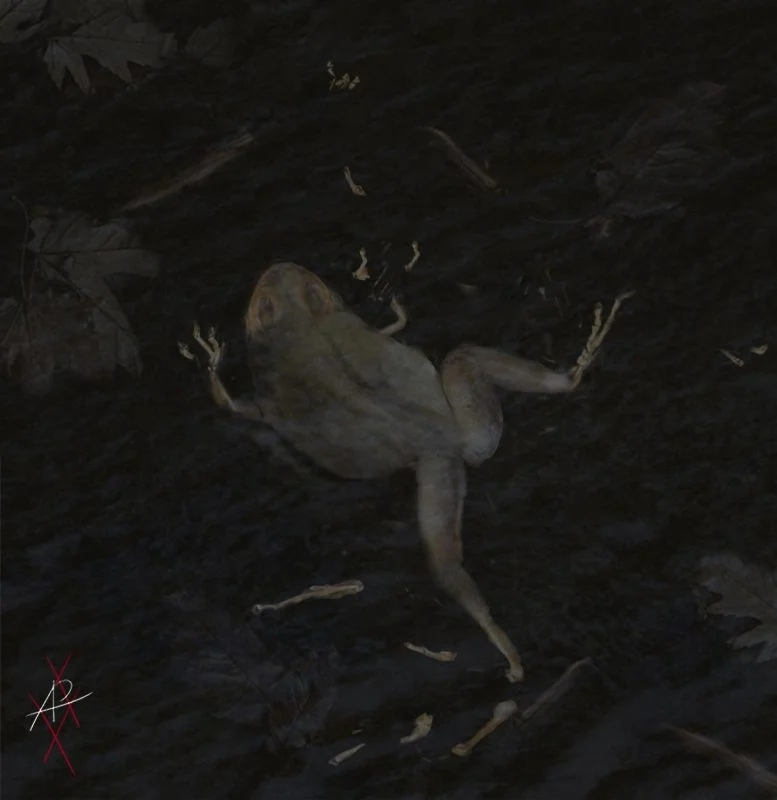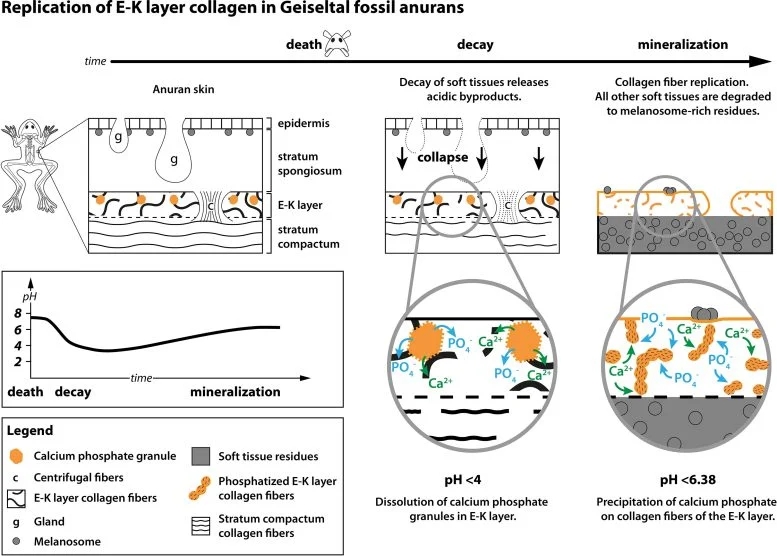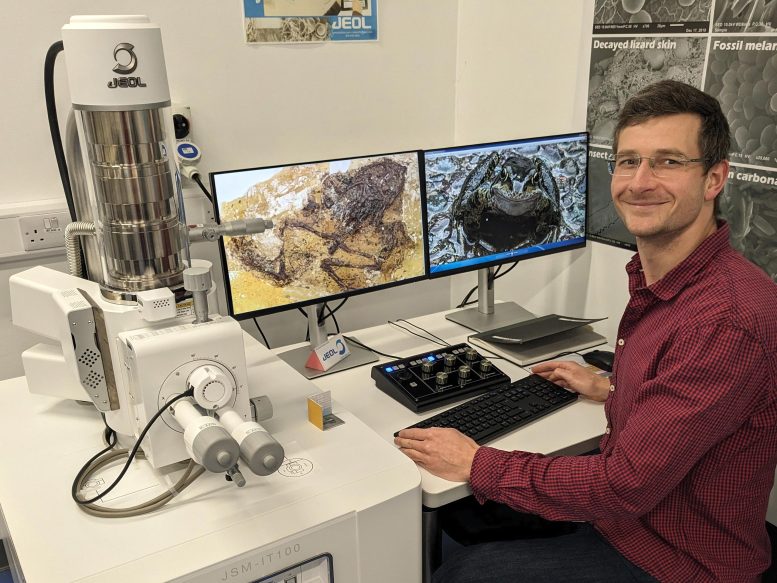博文
老科学,新转折:古青蛙化石颠覆了百年信仰  精选
精选
||
老科学,新转折:古青蛙化石颠覆了百年信仰
诸平
Fig. 2 The replication process of the frog skin at a glance. Credit: D. Falk, see Falk et al. 2024.
据爱尔兰科克大学学院(University College Cork简称UCC)2024年4月23日提供的消息,老科学,新转折:古青蛙化石颠覆了百年信仰(Old Science, New Twists: Ancient Frog Fossils Disrupt 100-Year-Old Beliefs)。
古生物学家发现,4500万年前青蛙化石的特殊保存可以归因于它们皮肤的矿化,这为它们适应陆地提供了新的见解。爱尔兰科克大学学院(UCC)的古生物学家解决了一些青蛙化石如何保存其肉质部分的百年谜团。他们发现这完全取决于它们的皮肤。
古生物学家丹尼尔·福尔克(Daniel Falk)和玛丽亚·麦克纳马拉教授(Prof. Maria McNamara)与来自爱尔兰、德国和英国的科学家一起,研究了德国中部盖泽尔遗址(Geiseltal site in central Germany)出土的4500万年前的青蛙化石。值得注意的是,这些化石显示了软组织的全身轮廓。研究小组发现,青蛙化石之所以保存完好,是因为保存了古代的皮肤残留物。
先进分析技术(Advanced Analytical Techniques)
研究小组使用高精度技术研究这些化石,包括扫描电子显微镜(scanning electron microscopy)、同步X射线分析(synchrotron-X-ray analyses)和红外光谱(infrared spectroscopy)。当这些化石在20世纪初被发现时,这些技术还不具备。
研究负责人、丹尼尔·福尔克(Daniel Falk)博士说:“青蛙皮肤化石的保存质量令人惊叹,甚至连胶原纤维等亚细胞结构也被保存了下来。青蛙的皮肤在矿物质磷酸钙中复制,磷酸钙帮助它存活了数百万年。”
洞悉蛙类化石栖息地(Insights Into Fossil Frogs’ Habitat)
丹尼尔·福尔克说:“皮肤保存得很好,我们甚至可以计算出青蛙化石的栖息地。保存下来的皮肤显示出防止干燥的适应性,这表明这些化石青蛙实际上大部分时间都是在陆地上度过的。”
通讯作者玛丽亚·麦克纳马拉教授说:“软组织化石经常揭示动物生物学的隐藏信息。我们发现青蛙皮肤化石的保存方式与欧洲其他地点的青蛙化石相同。”
重新评估历史化石(Reevaluating Historical Fossils)
这一发现非常令人兴奋,因为它推翻了持续了近百年的科学观点。更重要的是,化石保存的重复模式告诉我们,青蛙在4500万年前进化出了适应干旱陆地生活的特殊能力。这项研究强调了历史化石收藏的有用性,以及使用现代技术重新评估历史标本的必要性。这项研究于2024年4月23日已经在《科学报告》(Scientific Reports)杂志网站发表——Daniel Falk, Oliver Wings, Richard Unitt, Jon Wade, Maria E. McNamara. Fossilized anuran soft tissues reveal a new taphonomic model for the Eocene Geiseltal Konservat-Lagerstätte, Germany. Scientific Reports, 2024, 14, Article number: 7876. DOI: 10.1038/s41598-024-55822-y. Published: 23 April 2024. https://www.nature.com/articles/s41598-024-55822-y
这项研究是爱尔兰科克大学学院(UCC)、德国哈雷-维滕贝格马丁-路德大学(Martin-Luther-University Halle-Wittenberg, Germany)、德国班贝格自然历史博物馆(Natural History Museum Bamberg, Germany)和英国牛津大学 (University of Oxford, UK)研究人员合作研究的一部分,得到了爱尔兰研究委员会{Government of Ireland-Irish Research Council (IRC) Postgraduate Scholarship GOIPG/2018/3354}、欧洲研究委员会(European Research Council Consolidator Grant ERC-COG-2020-1010003293-PALAEOCHEM)和国际沉积学家协会{International Association of Sedimentologists (IAS) Postgraduate Research Grant}的资助。
https://www.nature.com/articles/s41598-024-55822-y
上述介绍,仅供参考。欲了解更多信息,敬请注意浏览原文或者相关报道。
The Eocene Geiseltal Konservat-Lagerstätte (Germany) is famous for reports of three dimensionally preserved soft tissues with sub-cellular detail. The proposed mode of preservation, direct replication in silica, is not known in other fossils and has not been verified using modern approaches. Here, we investigated the taphonomy of the Geiseltal anurans using diverse microbeam imaging and chemical analytical techniques. Our analyses confirm the preservation of soft tissues in all body regions but fail to yield evidence for silicified soft tissues. Instead, the anuran soft tissues are preserved as two layers that differ in microstructure and composition. Layer 1 comprises sulfur-rich carbonaceous microbodies interpreted as melanosomes. Layer 2 comprises the mid-dermal Eberth–Katschenko layer, preserved in calcium phosphate. In addition, patches of original aragonite crystals define the former position of the endolymphatic sac. The primary modes of soft tissue preservation are therefore sulfurization of melanosomes and phosphatization of more labile soft tissues, i.e., skin. This is consistent with the taphonomy of vertebrates in many other Konservat-Lagerstätten. These findings emphasize an emerging model for pervasive preservation of vertebrate soft tissues via melanosome films, particularly in stagnation-type deposits, with phosphatization of more labile tissues where tissue biochemistry is favorable.
https://blog.sciencenet.cn/blog-212210-1431207.html
上一篇:最大的癌症全基因组测序研究
下一篇:抗生素的突破:革命性的中国研究为超级细菌击败药物铺平了道路


